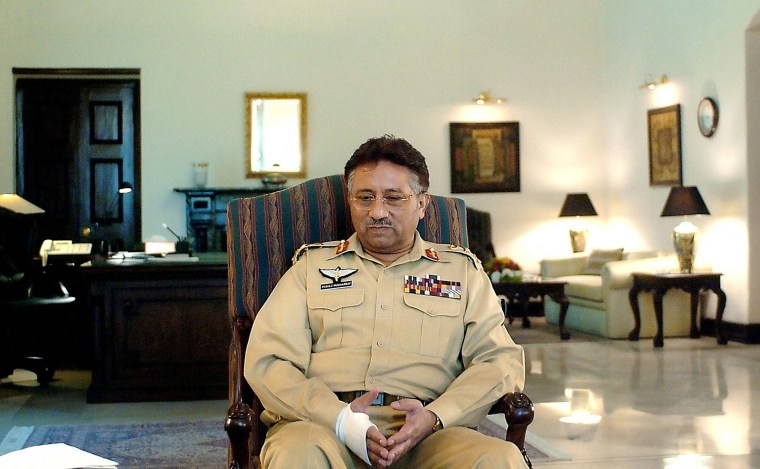A Pakistani court sentenced Pervez Musharraf, the country’s former president and army chief, to death Tuesday for high treason in a historic verdict that may well be a harbinger of a new political age.
Counterintuitively, the death sentence is a huge win for civil society and democracy. It is the first time in the country’s history that a military leader has faced any kind of accountability for a coup or a dictatorship — and it comes from a country that has spent around half of its existence under explicit military rule, with the military wielding considerable political power almost all of the rest of the time.
The judgment almost certainly will not be carried out, which is why those who object to capital punishment, such as myself, can appreciate it for its symbolic significance.
To be clear, the judgment almost certainly will not be carried out, which is why those who object to capital punishment, such as myself, can appreciate it for its symbolic significance. Musharraf has been in self-imposed exile in the United Arab Emirates since 2016, and he is very unlikely to return or to be extradited. He is being treated in Dubai for health issues, but he recorded a video statement from his hospital bed this month describing the case as “baseless” and proclaiming, “I’m being victimized.”
The military echoed the sentiment Tuesday, saying the verdict had been “received with a lot of pain and anguish” — showing that the sentence doesn’t sit well with some of the country’s power brokers. And that’s what makes the ruling so significant, even if it’s unenforceable: It’s a remarkable and courageous verdict for a country with a history of alleged military influence on judges, and it’s all the more impressive that it has happened at a time when Pakistan is ruled by a military-backed populist.
In a sign of the challenges ahead, gratuitous language in one of the three judges’ rulings suggesting that Musharraf should be hanged in Islamabad for three days went viral Thursday. It unfortunately undercut the verdict, as the legal community condemned its language and questioned its legality. It “robbed an otherwise well-reasoned & historic judgment of its moral and legal sanctity,” Salahuddin Ahmed, a Pakistani lawyer, tweeted.
Yet the larger dynamic is still at play. Zahid Hussain, a popular columnist, summed it up in Wednesday’s edition of Dawn, Pakistan’s leading English-language newspaper: “The death sentence may not be implemented but the court ruling carries far-reaching political implications.” Specifically, the era of the military’s undue and unchecked influence might be coming to an end.
Musharraf came to power when he led a bloodless coup in 1999, and in 2001 he appointed himself president. The high treason charge, the one for which he has been sentenced to death, was due to his having enacted a state of emergency in 2007 amid growing civilian discontent. Under that mantle, he suspended the constitution, enforced a blackout for non-government-run media outlets and removed the chief justice.
Political opponents and other activists condemned the authoritarian move. In response to domestic and international outcry, Musharraf ended the state of emergency and called elections for early 2008. It was during that campaign that Benazir Bhutto, one of his leading challengers, was assassinated. (He was later charged with her murder but couldn’t be tried as he was in exile.) He left Pakistan after his unsuccessful bid to lead the country but returned in 2013 to contest the next round of elections.
Although he lost in 2013, after which the judicial proceedings for treason began, the next elections, in 2018, ended more favorably for Musharraf when his ally Imran Khan was elected prime minister. Khan’s government has bitterly opposed Musharraf’s prosecution — which is unsurprising given that Khan is widely regarded as a military puppet — but it didn’t succeed in stopping the proceedings.
In the wake of this week’s verdict, Khan’s party is scrambling, holding an emergency meeting to decide how to proceed; it is going to support any appeals, although Musharraf would have to return to Pakistan to formally appeal. President Arif Alvi also reserves the right to pardon Musharraf, but that prospect is minimized because the party will likely want to avoid backlash.
What makes the ruling even more welcome is the way justice has often been subordinated to political interests, with judges sometimes facing threats if they defy the military.
What makes the ruling even more welcome is the way justice has often been subordinated to political interests, with judges sometimes facing threats if they defy the military. It isn’t entirely clear where this new judicial independence comes from — whether it’s simply the result of a handful of bold judges unwilling to be pressured or whether the shift is more structural — but the judiciary is unquestionably demanding accountability from the military and reimagining the political landscape.
For this trial to have culminated in a verdict challenging the near-omnipotent military sends a strong message. The ruling signals that for the judiciary — or, at least, influential factions within it — preserving democracy outweighs the military’s looming threat. It signals that the age of military immunity might be coming to an end, inevitably forcing power-hungry generals down the road to think twice before acting. And it says that civil society has had enough of being hamstrung by the military.


